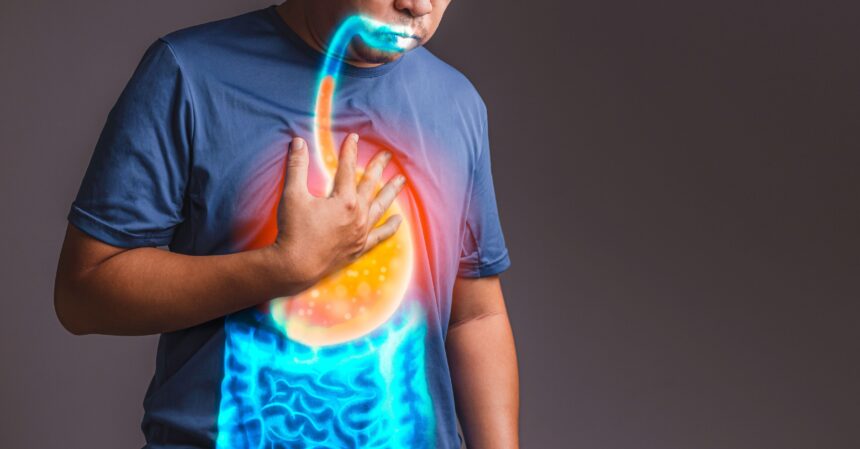Gastroesophageal reflux (GER) or heartburn is one of the most common digestive symptoms in the Western world. Not only is it uncomfortable, but it can be dangerous over the years if not corrected. Let’s see what are the main causes and some remedies for gastroesophageal reflux.
CAUSES OF GASTROESOPHAGEAL REFLUX
The reason why gastroesophageal reflux occurs is that the passage from the esophagus to the stomach, whose entrance is called cardia, is poorly closed and allows gastric contents to pass into the esophagus. This can occur for many reasons: reflux during pregnancy -because of the pressure that the fetus puts on the stomach-, obesity, hiatal hernia, smoking or as a side effect of some medications.
SYMPTOMS OF GASTROESOPHAGEAL REFLUX
The clearest and most common symptom, which gives its name to this pathology, is heartburn. However, there are other symptoms of gastroesophageal reflux: regurgitating ingested food, nausea and vomiting, coughing, bad breath, sore throat, etc.
WHY IS IT IMPORTANT TO REMEDY HEARTBURN?
Gastric reflux can be suffered at any age and it is convenient to correct it. Not only because of the discomfort of its symptoms, but also because, as the years go by, heartburn, which only this organ supports, can affect the walls of the esophagus. Thus, if left untreated, gastroesophageal reflux disease can lead to esophageal stricture or Barrett’s esophagus, a premalignant disease which, in a small percentage, can degenerate into esophageal cancer.
TREATMENT OF GASTROESOPHAGEAL REFLUX
The treatment of gastric reflux has several steps, depending on the stage and the patient’s response. The first of these can be easily performed and is one of the most important. It is a matter of respecting certain hygienic-dietary measures, such as avoiding large intakes that generate more acid, avoiding the use of alcohol, caffeine, nicotine, theine… Secondly, if the diet for gastroesophageal reflux has not worked, pharmacological treatment will be recommended. Nowadays we have a wide variety of proton pump inhibitors, which should be administered before breakfast to prevent reflux. Finally, in the presence of a bulky hiatal hernia, a definitive surgical measure could be adopted.
HOME REMEDIES FOR GASTROESOPHAGEAL REFLUX
Once we have seen what gastroesophageal reflux is and what causes it, here are 10 tips and “home remedies for gastroesophageal reflux”, how to combat heartburn:
- Reduce portions: Copious meals favor the opening of the cardia, so, eating less and more times a day reduces heartburn.
- Eat slowly: It takes 20 minutes for the stomach to tell us that it is full. If we eat faster, we may end up eating more than we need and chewing less, which means more work for the stomach.
- Cooking soft: Do not cook very heavy food and control the amount of oil that is used, it favors a lighter digestion. Good examples are: baked, boiled, steamed, papillote, grilled, etc.
- To sleep favoring the digestion: To sleep with the head somewhat incorporated and at least two or three hours after having had supper. In this way, we make sure that the digestion is done and there is no risk of gastroesophageal reflux.
- Avoid pressure on the stomach: We must avoid pressure in the abdominal region; either by excess weight, tight clothing at waist level… If there is physical pressure on the stomach, it is easier for the cardia to open and let contents into the esophagus.
- Drink herbal teas: Infusions, such as chamomile or rosemary, help soothe heartburn and acidity.
Foods to avoid in order to prevent heartburn
- Coffee, alcohol and chocolate: These three foods are irritants of the stomach mucosa, so they will favor gastroesophageal reflux.
- Carbonated beverages: Carbonated beverages increase the volume inside the stomach and favor its contents to go up into the esophagus.
- Condiments: Some condiments, such as spicy or mint, favor stomach acidity.
- Fried food: It goes without saying that fried foods are indigestible and this does not favor the control of gastric reflux.
It is important to make these changes to improve the symptoms of gastroesophageal reflux and heartburn. Taking these measures, in the short term, will improve the sufferer’s quality of life. In the long term, it can prevent further problems.













